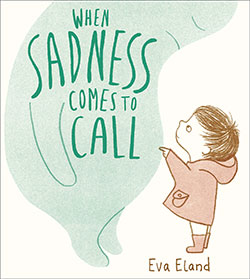“Maybe all it wants to know is that it is welcome.”
The story is in essence an exploration and description of a period of sadness and how it can affect you and others. Gentle suggestions of things that you can do to alleviate the sadness are woven in to the words and pictures. Rather than illustrate the story literally, Eva Eland has depicted sadness as a non-threatening blob-like character who appears at a child’s door one day, quite unexpectedly. At first the child (whose gender is not specified) pushes Sadness away, hiding it in a broom cupboard, but this only makes things worse and the child starts to feel absorbed in the emotion themselves. Then the child starts to listen to Sadness, and tries to accept it and understand it, realising it is something that needn’t be feared or resisted. The child is shown ‘befriending’ Sadness: sitting quietly with it, listening to music, drawing and drinking hot chocolate together. The child coaxes Sadness outside for some fresh air and literally embraces it, making it feel welcomed. Towards the end of the story, Sadness shrinks and then disappears altogether overnight. The narrator advises the reader not to worry about this – ‘tomorrow is a new day’.
As with many great picture books, When Sadness Comes to Call‘s simple yet skilful illustrations and minimal wording perfectly reflect a big concept and an important message in an accessible, child-friendly way. The reader is encouraged to accept a period of sadness as a perfectly normal part of life; not to fear it, worry about it or hide it. The child in the story switches roles a few times: sometimes he/she is the person feeling sad, at other times the one who is supporting and trying to understand Sadness. While I found this slightly confusing, it also means that it’s a useful book for children who have loved ones with depression, as well as for children who have experienced sadness themselves.
 A powerful exploration of sadness, this picture book helps children to accept and process periods of sadness and empathise with and support others who are experiencing sadness or depression.
A powerful exploration of sadness, this picture book helps children to accept and process periods of sadness and empathise with and support others who are experiencing sadness or depression. 
